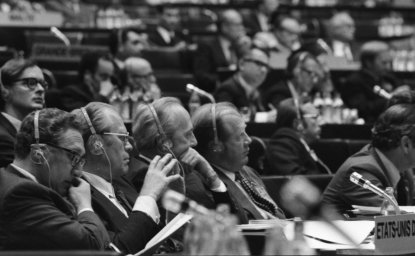Market Bolshevism against Democracy


Yeltsin's desire to remain in power at any cost after the events of 1993 compromised the growth of a successful democracy in post-Soviet Russia, argued Peter Reddaway, Professor of Political Science and International Affairs, George Washington University, and former Director, Kennan Institute at a 19 March 2001 lecture at the Kennan Institute. Reddaway stated that Yeltsin's method of imposing market reforms from above required the undermining of democracy. Reddaway labeled this approach of imposing quasi-market institutions on Russia "market bolshevism," a phrase used in the title of his and Dmitri Glinski's recently published book, The Tragedy of Russia's Reforms: Market Bolshevism against Democracy.
To control the crisis of 1991, Yeltsin and his advisors advocated shock therapy, freeing many prices from government control, reducing government spending, courting financial backing from western institutions, as well as trying to create the institutional and legal infrastructure to support a market economy. Reddaway argued that accomplishing these goals was both culturally and politically impossible.
Since successive Russian parliaments opposed this economic strategy, Yeltsin had to undermine the very foundation of his democratic policy, often ruling by decree. Citing manipulated elections, plans of 1996 to dissolve parliament, and his relationship with the oligarches, Reddaway noted that "by 1998, Yeltsin's regime and the Russian state had become not just dangerously weak and corrupt, but also... financially dependent on Russia's wealthy elite and also on the West."
In 1993, Yeltsin both dissolved the parliament and used armed force. It was during the time following these events that Yeltsin's dependency on the oligarches was firmly ensconced in his political operations, thereby exacerbating "the loss of legitimacy on the part of the state and its institutions." Yeltsin's advisors, Aleksandr Korzhakov in particular, were interested in limiting the drop in Yeltsin's popular support, and embarked on several strategies to regain his popularity, including an attempt to link popular support to nationalism by launching the war in Chechnya in December 1994.
Another strand of this strategy was the development of "slush funds" for Yeltsin. He gave tax breaks to favored organizations on the understanding they would support him politically and financially in return. Also, Yeltsin's second volume of memoirs--financed by Boris Berezovsky and his associates--was used to corrupt him and his family. The three million dollars raised by this group were placed in one of Yeltsin's accounts, with the monthly interest deposited in a safe in Yeltsin's office. Though Yeltsin was told that these deposits were advances, they were in fact a bribe, and he was inextricably linked thenceforth to the interests of the oligarches.
While Reddaway highlighted the dependency created by these events, he acknowledged that some degree of corruption would have occurred during these years regardless of the personal corruption of Yeltsin. An interesting consequence of Yeltsin's dependency was that "Berezovsky's corruption of Yeltsin personally did reduce Yeltsin's personal power... thus reducing any possible danger of a strongly personal authoritarianism under Yeltsin."
Yeltsin's focus on preserving his personal power was particularly clear in the events on March 1996, three months before the scheduled date for the presidential elections. While most writers and commentators have praised Russia for holding these elections, Reddaway pointed out that it later became clear that Yeltsin had decided to dissolve the parliament and postponed the presidential elections. Yeltsin consulted with his relevant colleagues and systematically lied to each of them, stating that everyone had agreed to the operation. It was only when the Interior Minister, Anatoly Kulikov, consulted them individually that Yeltsin's trickery was discovered. When confronted, Yeltsin refused to back down at first, though he did change his mind by the next morning.
These events, stated Reddaway, demonstrate that "Yeltsin had no firm commitment to his own constitution and the institutions that it purported to legitimate. Faced with the possibility of losing by far the most powerful office in the political system, he didn't hesitate to hang onto this office by crudely violating one of the constitution's most important provisions." If not for Kulikov, Reddaway noted that Yeltsin may well have succeeded in subverting the political process.
A particularly harrowing aspect is that Yeltsin was acting in response to pressures from the oligarches to postpone the elections and rid the system of the communists. Following the failure of this tactic, Yeltsin, Anatoly Chubais, and the oligarches, in effect, rigged the election by spending hundreds of times more than the amount allowable for campaigns.
Putin, as Yeltsin's successor, has the pivotal role of determining whether the market bolshevism policy will continue. Reddaway sees Putin as a product of the Yeltsin system, who, "if he does try to change the system... will find himself a prisoner of the system." Though his style differs, his strategy is fundamentally a continuation of market bolshevism, leaving Russia in the lurch until new reform movements emerge.

The Kennan Institute is the premier US center for advanced research on Eurasia and the oldest and largest regional program at the Woodrow Wilson International Center for Scholars. The Kennan Institute is committed to improving American understanding of Russia, Ukraine, Central Asia, the South Caucasus, and the surrounding region through research and exchange. Read more



